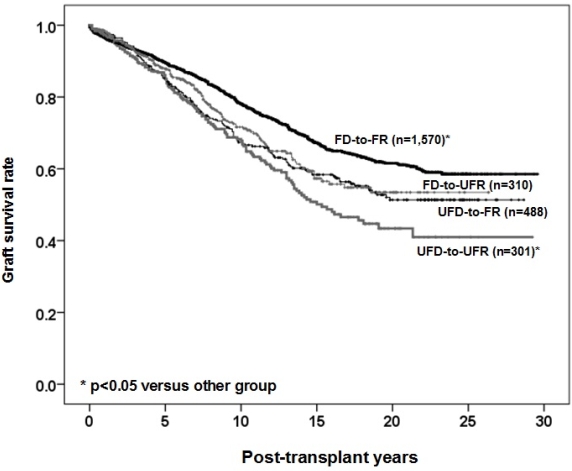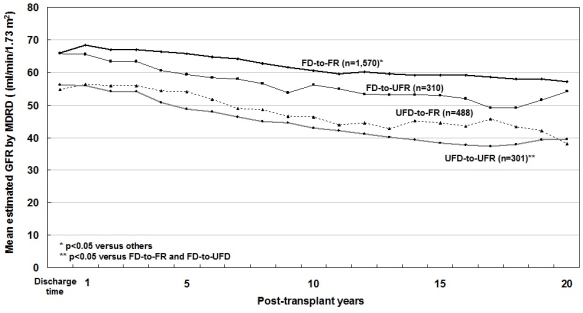Matching of Recipient and Donor Age Is the Most Powerful Risk Factor Affecting to Long-Term Graft Survival and Function
1Department of Tranplantation Surgery, Yonsei University Health System, Seoul, Republic of Korea
2The Research Institute for Transplantation, Yonsei University College of Medicine, Seoul, Republic of Korea.
Meeting: 2015 American Transplant Congress
Abstract number: C164
Keywords: Age factors, Graft function, Graft survival, Kidney transplantation
Session Information
Session Name: Poster Session C: Living Donor Issues 2
Session Type: Poster Session
Date: Monday, May 4, 2015
Session Time: 5:30pm-6:30pm
 Presentation Time: 5:30pm-6:30pm
Presentation Time: 5:30pm-6:30pm
Location: Exhibit Hall E
Recipient age and donor age were typical non-immunologic parameters affecting to graft survival rate (GSR). Using more than 3,000 cases of living donor transplantation database in single center, we verified the respective or combined effect of recipient and donor age on long-term GSR and graft function.
From 3,633 kidney transplantation, 2,669 cases of calcineurin inhibitor based, non-HLA identical, living donor, and adult transplantation were retrospectively reviewed. The effect of age were evaluated by uni-/multi-variate survival analysis and ANOVA test.
In univariate survival analysis, recipient and donor age was respectively effect on GSR. Elderly(more than 60 years old) recipient and young (less than 30 years old) recipient group showed inferior GSR (49.4% and 47.8% vs. 60.4% in 20 years GSR). And elderly(more than 45 years old) donor group also showed inferior GSR (48.5% vs. 59.6% in 20 years GSR). But, elderly recipient was not independent risk factor in multivariate analysis. In recipient-donor age matching survival analysis, elderly donor-to-young recipient group showed the highest risk (Odd ratio=1.730 (1.395∼2.080)) compared with Non-elderly donor-to-middle age recipient match(p<0.001). Elderly donor-to-young recipient group showed persistently inferior graft function until post-transplant 20 years (42.9 ± 14.5 and 39.5 ± 20.1 ml/min/1.73m2 vs. 60.4 ± 18.6 and 57.1 ± 18.9, e-GFR at post-transplant 10 and 20 years) (p<0.001)


Elderly donor, not elderly recipient, is major non-immunologic risk factor affecting to GSR and graft function. Elderly donor-to-young recipient matched group showed the worst long-term transplant results.
To cite this abstract in AMA style:
Lee J, Lee Y, Lee J, Joo D, Huh K, Kim S, Kim Y, Kim M. Matching of Recipient and Donor Age Is the Most Powerful Risk Factor Affecting to Long-Term Graft Survival and Function [abstract]. Am J Transplant. 2015; 15 (suppl 3). https://atcmeetingabstracts.com/abstract/matching-of-recipient-and-donor-age-is-the-most-powerful-risk-factor-affecting-to-long-term-graft-survival-and-function/. Accessed July 3, 2025.« Back to 2015 American Transplant Congress
